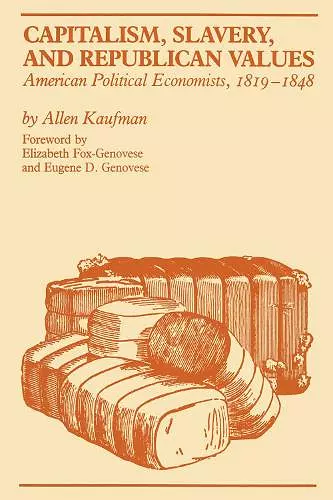Capitalism, Slavery, and Republican Values
American Political Economists, 1819-1848
Allen Kaufman author Eugene D Genovese editor Elizabeth Fox-Genovese editor
Format:Paperback
Publisher:University of Texas Press
Published:1st Feb '83
Currently unavailable, and unfortunately no date known when it will be back

"Brilliant ... advances our understanding of the North-South divergence and the origins of the Civil War [and] our understanding of American economic thought and intellectual history in general." -- Elizabeth Fox-Genovese and Eugene D. Genovese
A study of the views of American political economists during the antebellum period.
In the troubled days before the American Civil War, both Northern protectionists and Southern free trade economists saw political economy as the key to understanding the natural laws on which every republican political order should be based. They believed that individual freedom was one such law of nature and that this freedom required a market economy in which citizens could freely pursue their particular economic interests and goals.
But Northern and Southern thinkers alike feared that the pursuit of wealth in a market economy might lead to the replacement of the independent producer by the wage laborer. A worker without property is a potential rebel, and so the freedom and commerce that give birth to such a worker would seem to be incompatible with preserving the content citizenry necessary for a stable, republican political order.
Around the resolution of this dilemma revolved the great debate on the desirability of slavery in this country. Northern protectionists argued that independent labor must be protected at the same time that capitalist development is encouraged. Southern free trade economists answered that the formation of a propertyless class is inevitable; to keep the nation from anarchy and rebellion, slavery—justified by racism—must be preserved at any cost.
Battles of the economists such as these left little room for political compromise between North and South as the antebellum United States confronted the corrosive effects of capitalist development. And slavery's retardant effect on the Southern economy ultimately created a rift within the South between those who sought to make slavery more like capitalism and those who sought to make capitalism more like slavery.
ISBN: 9780292741225
Dimensions: unknown
Weight: 454g
220 pages